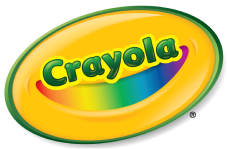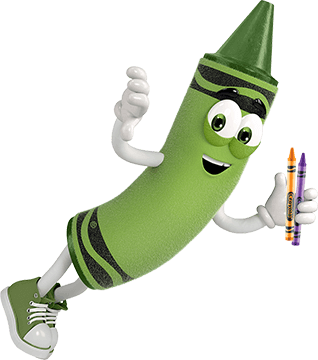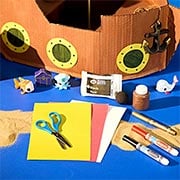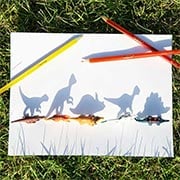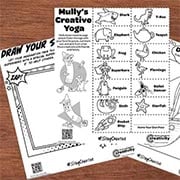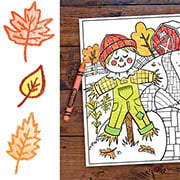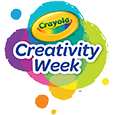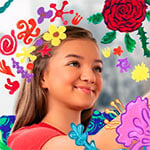Crayola Sidewalk Chalk is a molded chalk made of Plaster of Paris and color pigments. Although it is designed to be used on sidewalks and driveways, the chalk contains colorants, which may stain clothing and other household surfaces. If the chalk is used on a newly poured sidewalk or driveway, there is a possibility that the open surface pores in the concrete could absorb the colors.
We suggest testing Crayola Sidewalk Chalk in an inconspicuous area and then washing it away with water. In most cases, chalk markings wash away with the first rainfall if used on a paved or poured surface that is more than two years old.
Crayola offers stain removal suggestions as a service to consumers. You can find this information on the Crayola Stain Removal Tips page.
Please bear in mind that while all stain removal suggestions have been tested in our laboratory, results are not guaranteed. We recommend testing any suggestion in an inconspicuous area first.
If you have additional questions, we would love to hear from you! Feel free to call or text us at 1-800-272-9652 weekdays between 9 AM and 4 PM Eastern Time. If you prefer to send us an email, please visit the Crayola Contact Us page.
If you have additional questions, we would love to hear from you! Feel free to call or text us at 1-800-CRAYOLA weekdays between 9 AM and 4 PM Eastern Time. If you would prefer to send us an email, visit our contact us page.
Related Questions
Explore answers to common questions, helpful stain removal tips, and creative ideas for making the most of our art supplies and free resources!
-
Crayola® manufactures two types of chalk, extruded and molded.Extruded chalk, such as Crayola Anti-Dust® White Chalk, primarily contains calcium carbonate. Molded chalk, such as Crayola Children's Chalk (available in white or colors), is a softer chalk, and is not dustless. This type of chalk is recommended for children's chalkboards as well as construction paper, cardboard boxes and paper bags.Crayola Sidewalk Chalk is a molded chalk that is not intended for use on chalkboard surfaces. It does not include calcium carbonate. This product contains Plaster of Paris which has a gritty texture and may scratch your chalkboard.Learn more about Crayola Chalk products at Crayola.com.
-
Crayola® manufactures several products and colors that will fluoresce under a black light. Depending on the pigment, the fluorescent level may vary. They are:• Glow in the Dark Silly Putty®• Model Magic® Neon Colors• Neon Crayons• The following colors only in the 8-count package: atomic tangerine, laser lemon, outrageous orange, and shocking pink• The following colors only in the 24-count package: laser lemon, wild watermelon, sun glow, atomic tangerine, screaming green, and shocking pink (regular, pearlescent, and pearlescent glitter)• Neon Colored Pencils• 9 colors only in the 12-count package: unmellow yellow, outrageous orange, laser lemon, spring frost, electric lime, hot magenta, atomic tangerine, shocking pink, purple pizzazz• Neon Washable Broadline Markers• 7 colors only in the 10-count package: atomic tangerine, purple pizzazz, screamin' green, shocking pink, electric lime, laser lemon, neon carrot• Neon Washable Sidewalk Chalk• The following colors only, in the 5-count package: atomic tangerine and extreme blue• Premier Fluorescent Paint• Twistables® Colored Pencils• The following colors only in the 18-count package: fluorescent orange, fluorescent pink, fluorescent yellow
-
Crayola® did not invent the crayon. The "modern" crayon originated in Europe, initially made from a mixture of charcoal and oil, later replaced by powdered pigments. Wax was later substituted for oil, making the sticks sturdier and easier to handle.
In 1902, Crayola Crayons were invented by Binney & Smith and first offered for sale in 1903. The trade name "Crayola" was coined by Mrs. Edwin Binney, combining "craie" (French for chalk stick) and "oleaginous" (oily).
Crayola manufactures over 3 billion crayons each year, primarily made from paraffin wax and color pigment. Learn more about Crayola's colorful history at Crayola.com.
-
While the color pigments in most Crayola® products are not permanent and will fade over time when exposed to strong light, the Crayola products below are permanent and light-fast on most paper surfaces.
-
Art can be messy, so our experts have created pro tips to help. Visit Crayola.com to find stain removal solutions for Crayola products on a variety of surfaces.
